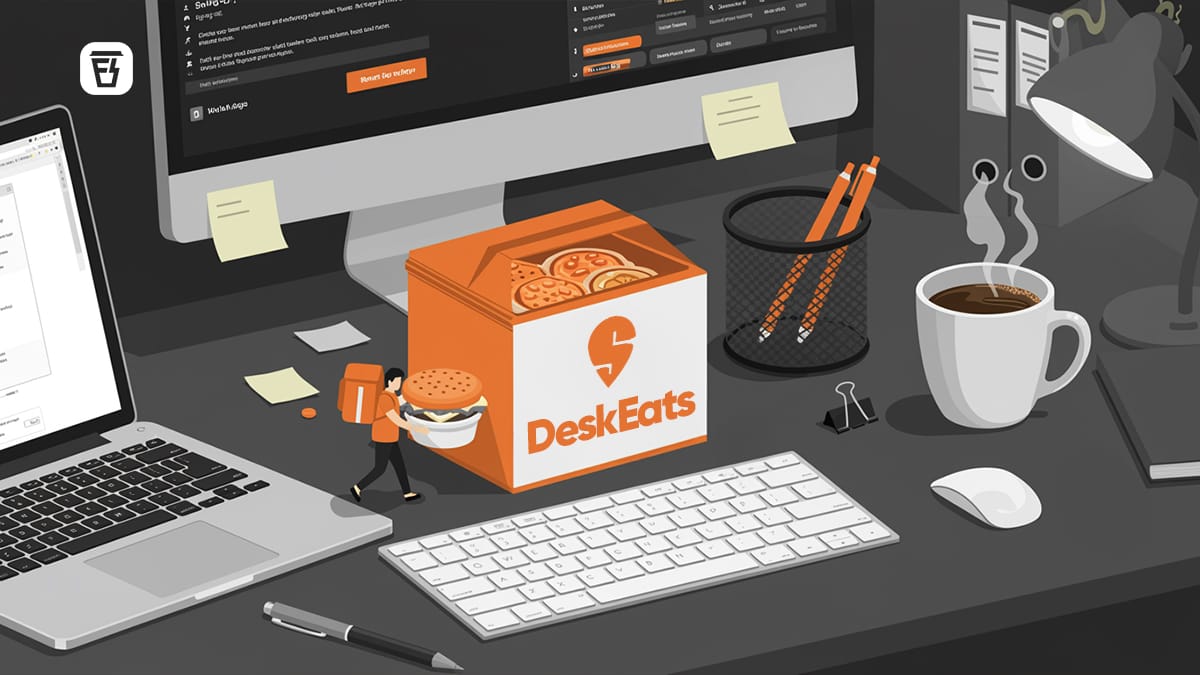Can office lunches help fix Swiggy's finances?

In today’s Finshots, we dive into Swiggy’s new bet — DeskEats, and if it could help the food delivery giant inch closer to profitability.
But before we begin, if you’re someone who loves to keep tabs on what’s happening in the world of business and finance, then hit subscribe if you haven’t already. If you’re already a subscriber or you’re reading this on the app, you can just go ahead and read the story.
The Story
Just last week, Swiggy dropped its quarterly results. And they were a bit of a mixed bag.
On the bright side, the company’s operating revenue jumped by a solid 54% year-on-year (YoY) to ₹4,961 crores. But on the not so bright side, net losses widened, almost doubling to ₹1,197 crores. And that caught analysts off guard, especially since most were expecting losses to stay below ₹970 crores.
But just as everyone was digesting the numbers, Swiggy quietly rolled out something new this week — DeskEats.
What’s that, you ask?
Well, it’s Swiggy’s new food delivery model built specifically for the office crowd. The idea is pretty simple. Make it easier for working professionals to order food that’s quick, convenient and easy to eat at their desks. We’re talking about light munchies, team treats and one-handed snacks — all tailored to fit into a busy workday without the need for plates, cutlery or even a proper break.
Just type “office” on Swiggy and you’ll see what we’re talking about. You’ll see a specially curated menu with categories like Stress Munchies, Deadline Desserts, One-handed Grabbies and Teamwork Bites. It’s a clever way to repackage food for the office desk.
Now you’re probably thinking, “Doesn’t Swiggy already have something like this with ‘Snacc’, its all-day breakfast and quick-bites service? So why launch DeskEats?”
While that’s a sensible question to ask, the thing is that Snacc does deliver munchies in 10–15 minutes. But it’s not necessarily built for the desk. Some of those items might require cutlery. Others might not travel well. And most importantly, they’re not tailored for team orders or the kind of quick nibbling where you might be jumping between meetings. DeskEats is Swiggy’s attempt to plug that gap by making food desk-friendly without requiring users to scroll endlessly.
And from a business lens, this move could actually make sense.
Because offices create delivery density.
By targeting high-density office zones where large groups of employees are clustered, Swiggy can club multiple orders within a tight delivery radius. This kind of delivery route efficiency reduces the cost per order. It also improves the platform’s gross order value or GOV, a key metric that jumped by 45% YoY to ₹14,797 crores in Q1 FY26.
Now pair that with another number: delivery-related expenses, which rose by 25% in the same quarter to ₹1,313 crores. If DeskEats can increase order frequency from officegoers by just about 10–15%, and nudge up average order value (AOV) by even 5–7% with team combos or snacks, it could start contributing meaningful revenue at slightly better margins than regular food deliveries.
But there’s more.
DeskEats isn’t just a consumer experiment. It’s built on top of Swiggy’s Corporate Rewards Program, a B2B (business to business) initiative that’s quietly grown to over 14,000 companies and 1.5 lakh employees in just three months. It lets employers offer food-related perks like discounts and vouchers to employees on Swiggy.
So while Swiggy’s core model is B2C (business to consumer), DeskEats essentially creates a B2B2C loop. It brings in sticky partnerships with employers, and through them, ties in a large base of daily office-goers. That means Swiggy doesn’t have to spend as heavily on advertising and discounts to win over each customer. And that’s a big win because advertising and promotional expenses jumped a whopping 130% YoY in the latest quarter.
This kind of stickiness could also turn ordering into a habit not just during lunch hours, but spread across the workday. Think mid-morning snacks or evening bites. And that could help flatten the usual peak hour rush and improve delivery efficiency.
There’s also a chance for a phenomenon that you could call “corporate lock-in”. This is simply to say that once a company’s employees are hooked onto easy, subsidised desk meals, and companies are used to offering them, switching to another platform becomes less likely. That lowers future marketing costs. And if ordering lunch from Swiggy becomes a routine part of the workday, especially for teams, that’s repeat revenue without fresh acquisition spend.
Plus, when people order at work, they’re okay paying a slight premium for convenience. That could push up AOVs further. And the more transactions Swiggy can rack up without adding to its fixed costs like platform maintenance, the better its profit earning potential becomes. That translates into each order contributing more to the bottom line.
Sounds good so far, right?
But then, there’s a flip side too.
Food delivery in India is a tricky business. The moment one platform launches something, the others follow. Just look at what’s happening with Zepto Cafe. It became a quick success with 700% YoY order growth and ₹1,000 crore in annualised net sales. But despite that it had to scale down operations, largely because of backend issues like staff shortages and operational inefficiencies and buzz about Zomato launching Blinkit Foods to compete. That’s a reminder that scaling food operations in India is no easy feat, especially when supply chains are fragile and competition is cut throat.
Swiggy could face similar bottlenecks. Rivals might hop on the bandwagon. And delivery partner shortages are already a concern, thanks to the quick-commerce boom. So, if too many desks want lunch at the same time, and Swiggy doesn’t have enough partners available, DeskEats could fall flat on its face.
There’s also the simple truth that not everyone wants to eat at their desk. For many officegoers, lunch is a welcome break — a chance to step out, unwind or socialise with colleagues. Cafes in tech parks and around offices cater to this need with better ambience, food variety and the promise of a mental break. So if DeskEats ends up trying to replace that experience, it might not see consistent demand.
That’s why positioning would be the key. If Swiggy markets this right — as a convenient complement to regular breaks, for those deadline days or lazy afternoons when stepping out isn’t an option, then it might just find its niche.
But there’s one more thing you can’t ignore.
Launching DeskEats will come with its own costs. Onboarding companies, running discounts, managing menu logistics. These things push up operational and marketing expenses in the short term. And let’s not forget that a big chunk of Swiggy’s losses still come from Instamart. That business continues to burn cash even as revenue grows. So DeskEats, while helpful, isn’t going to suddenly solve Swiggy’s profitability puzzle.
So yeah, if anything, office lunches and convenient desk eats could be the side dish Swiggy needs for its main course of financial health. But the company’s recipe for profitability, like any good meal, needs more than just one ingredient.
And we’ll have to wait and see if DeskEats reshapes food tech economics in India or simply leaves Swiggy hungry for profits.
Until then…
If this story helped you understand what DeskEats could do to Swiggy’s business in less time than an Instamart delivery, share it with your friends, family or even strangers on WhatsApp, LinkedIn and X.
🔊Introducing Pitch Perfect 2025!

If you've been following us for a while, you know our story didn't begin in a corporate boardroom. It started in a college dorm room with 3 broke students who chose to skip placements and chase something bigger.
That something was Finshots.
Today, Finshots reaches over 500,000 readers, and through Ditto, we've empowered 800,000+ Indians to make smarter insurance decisions.
Now, we're looking for the next game-changing idea to back.
Introducing Pitch Perfect 2025 – a flagship startup pitch challenge powered by Zerodha.
So, if you've got a BIG idea that could help Indians get better with money, pitch it to us!
What's at stake:
✅₹10,00,000 in prizes
✅Potential funding from Zerodha Rainmatter
✅All-expenses-paid trip to Bangalore to pitch directly to Nithin Kamath and industry veterans
Ready? 👉Apply Now!
